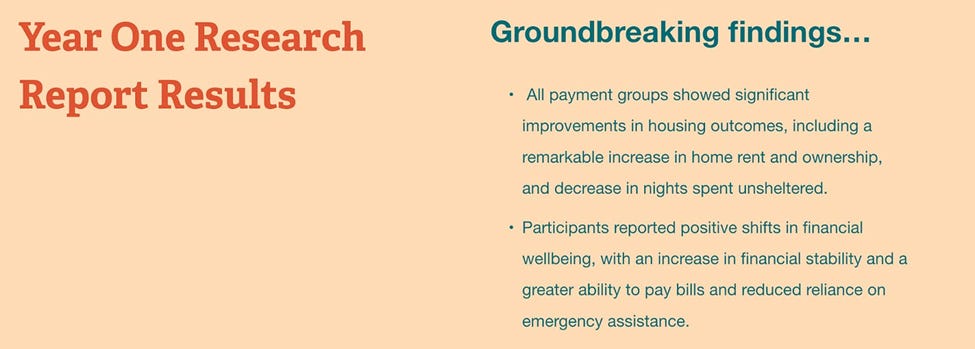Poor, Poor, Pitiful UBI Performance
There is one thing that is universal about universal basic income programs: gold-standard scientific studies all show that they do not work.
Universal Basic Income (UBI) payments do not improve recipients’ lives, a proponent of such plans has reluctantly concluded with laudable honesty. Gold-standard studies show that UBI does not work, writes Kelsey Piper at The Argument:
Just give people money. It’s the simple, brute-force solution to so many problems. In low-income countries, charities are sometimes measured against whether their interventions are better than simply giving people cash. Even in high-income countries like the U.S., when disaster strikes, often the best thing you can do is get money into the hands of affected people immediately. They know whether they should use it to buy gas, rent an Airbnb or fly to their cousin’s house one state over.
So it wasn’t that crazy to assume—particularly once promising pilots were released—that the same should be true for addressing chronic poverty in high-income countries. If you give a new mom a few hundred dollars a month or a homeless man one thousand dollars a month, that’s gotta show up in the data, right?
Although it “wasn’t that crazy to assume” that money makes people better off regardless of how it is obtained, it is untrue, Piper writes:
Alas.
A few years back we got really serious about studying cash transfers, and rigorous research began in cities all across America. Some programs targeted the homeless, some new mothers and some families living beneath the poverty line. The goal was to figure out whether sizable monthly payments help people lead better lives, get better educations and jobs, care more for their children and achieve better health outcomes.
Many of the studies are still ongoing, but, at this point, the results aren’t “uncertain.” They’re pretty consistent and very weird. Multiple large, high-quality randomized studies are finding that guaranteed income transfers do not appear to produce sustained improvements in mental health, stress levels, physical health, child development outcomes or employment. Treated participants do work a little less, but shockingly, this doesn’t correspond with either lower stress levels or higher overall reported life satisfaction.
Homeless people, new mothers and low-income Americans all over the country received thousands of dollars. And it’s practically invisible in the data. On so many important metrics, these people are statistically indistinguishable from those who did not receive this aid.
Piper recounts gold-standard (randomized controlled trial) studies that consistently and uniformly show the extra money has little to no effect on the recipients’ overall well-being even though they are not “blowing it all on ‘vices’ like gambling, tobacco or alcohol.” The payments do not improve “their health, not their sleep, not their jobs, not their education, and not even time spent with their children,” Piper writes. “They did experience a reduction in stress at the start of the study, but it quickly went away.”
The studies are comprehensive, accurate, and true, Piper writes:
I cannot stress how shocking I find this and I want to be clear that this is not “we got some weak counterevidence.” These are careful, well-conducted studies. They are large enough to rule out even small positive effects and they are all very similar. This is an amount of evidence that in almost any other context we’d consider definitive. And yet, you’d be hard-pressed to hear about it in the media.”
The American press consistently mislead the public about this research, as do the authors of less-reliable studies, through “death by a thousand press releases,” Piper notes:
The depressing facts I’ve recounted for you are largely missing, obscured or glossed over in the public communications about these studies. Articles focus on tiny positives or, at best, will note the evidence is uncertain. Very few articles or press releases put the big picture together even if they cover one disappointing result.
Perhaps the most egregious offender is the Denver Basic Income Project—the most bizarre set of findings I reviewed. This is what a prominent part of the report section of their website looks like:
“All payment groups showed significant improvements in housing outcomes, including a remarkable increase in home rent and ownership, and decrease in nights spent unsheltered.”
I guess I can’t call this a lie per se, but in reality they gave $1,000 a month to homeless people and they were barely more likely than the control group to get housing.
The American press has been mendacious in covering this issue, consistently concealing the failure of studies to indicate that UBI works. Piper writes,
It’s not just the researchers’ fault. Even when researchers don’t understate a null or negative result, they told me that journalists are often less eager to go to press with it. “[Researchers have] written a dozen null effect papers, they’re trying to get the result out there,” [study author Sarah] Miller told me. “People aren’t interested in reading [them].”
Piper rightly laments this mass denial of reality in which “widespread agreement on basic facts is scarce and noble lies have permeated the halls of truth-seeking organizations like the media.” (The media are not “truth-seeking organizations,” unfortunately.) Piper’s solution is to let the truth come out, whatever it is, and act accordingly. That is the position of a real scientist, policy analyst, policymaker, or decent human being.




Create a niche and it will be filled .
If you pay people to be idle, more people will be idle? Who would have expected that?